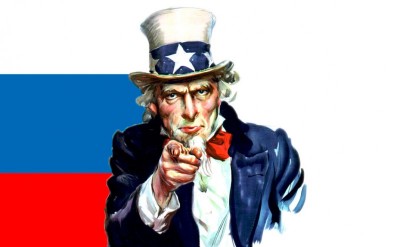More Illegal US Sanctions against Russia

Unilateral or jointly imposed sanctions by one or more countries against others are illegal. Authority rests solely with Security Council members.
They must first “determine the existence of any threat to the peace, breach of the peace, or act of aggression,” as UN Charter, Chapter VII, Article 39 stipulates.
They may then “decide what measures not involving the use of armed force are to be employed to give effect to its decisions, and it may call upon the Members of the United Nations to apply such measures,” as authorized under Article 41.
These may include complete or partial interruption of economic relations and of rail, sea, air, postal, telegraphic, radio, and other means of communication, and the severance of diplomatic relations.
It bears repeating. All unilateral or multilateral impositions of sanctions circumventing Security Council authority are illegal. America is by far the leading scofflaw – a lawless state operating by its own rules and standards exclusively, spurning fundamental rule of law principles repeatedly, ignoring what demands compliance.
On March 6, 2014, Obama signed Executive Order 13660 – a lawless diktat authorizing sanctions on individuals or entities allegedly involved in violating Ukraine’s sovereignty or territory.
On March 17, Executive Order 13661 followed – another extrajudicial diktat targeting Russia for its legitimate right to maintain a military presence in Crimea, its nonexistent undermining of so-called Ukrainian “democratic processes,” including nonsensical claims about threatening its peace, security, stability, sovereignty and territorial integrity.
On March 20, a third Executive Order “block(ed) property of additional persons contributing to the situation in Ukraine.”
Fact: No constitutional authority permits Executive Orders – other than stating “executive power shall be vested in a President of the United States of America (Article 2, Section 1).”
Its use is abused by bypassing Congress. “All legislative powers herein granted shall be vested in a Congress of the United States, which shall consist of a Senate and House of Representatives (Article 1, Section 1.).”
Constitutional checks and balances prevent empowering one governmental branch over another. Diktat power reflects tyranny.
On July 30, Obama imposed further sanctions on Russia by Executive Order – perhaps in response to its vetoing a Security Council resolution to establish a US-controlled MH17 kangaroo tribunal, one Washington wanted to hold Moscow and Donbass freedom fighters accountable for its own complicity in Kiev’s downing the commercial aircraft.
Eleven more individuals and 15 companies were targeted – including affiliates of oil giant Rosneft as well as others linked to Vnesheconombank (a state owned Bank of Foreign Economic Activity called the Russian Development Bank).
Eight have ties to Russian businessman Gannady Timchenko. Four are former Ukrainian Yanukovych administrations officials. Five are involved in Crimean port or sea ferry operations.
The US Treasury Office of Foreign Assets acting director John E. Smith commented, saying:
Today’s action underscores our resolve to maintain pressure on Russia for (its nonexistent violations of) international law (or involvement in) fueling the conflict in eastern Ukraine. Our message is clear. We will continue to act to ensure the effectiveness of our sanctions.
Other senior US officials lied saying Thursday’s action was “routine,” not an “escalation.” It’s further proof of Washington continuing to act provocatively, upping the stakes, headed toward likely direct belligerent confrontation if these actions along with military ones in Eastern Europe continue.
Longstanding US policy calls for regime change – replacing Russian sovereignty with US-controlled puppet governance, pillaging its resources, balkanizing its huge land mass for easier control and exploiting its people.
Paul Craig Roberts is right saying Washington “wants to coerce Russia into submission.” He cites the (Paul) Wolfowitz Doctrine – co-authored with his deputy Scooter Libby when he was Bush I’s Under Secretary of Defense.
Its core principles were part of the Bush (II) Doctrine – what the late Senator Edward Kennedy described as “a call for 21st century American imperialism that no other nation can or should accept.”
Roberts explains US policymakers consider any country “capable of standing up to Washington” a threat to its national security. “Today there are two such countries, Russia and China.
Washington always needs an enemy in order to justify the one trillion dollar annual budget of the military/security complex” and endless wars of aggression waged against invented adversaries threatening no one.
America’s hegemonic ambitions aim for achieving unchallenged world dominance – madness risking WW III…
Stephen Lendman lives in Chicago. He can be reached at [email protected].
His new book as editor and contributor is titled “Flashpoint in Ukraine: US Drive for Hegemony Risks WW III.”
http://www.claritypress.com/
Visit his blog site at sjlendman.blogspot.com.
Listen to cutting-edge discussions with distinguished guests on the Progressive Radio News Hour on the Progressive Radio Network.
It airs three times weekly: live on Sundays at 1PM Central time plus two prerecorded archived programs.

